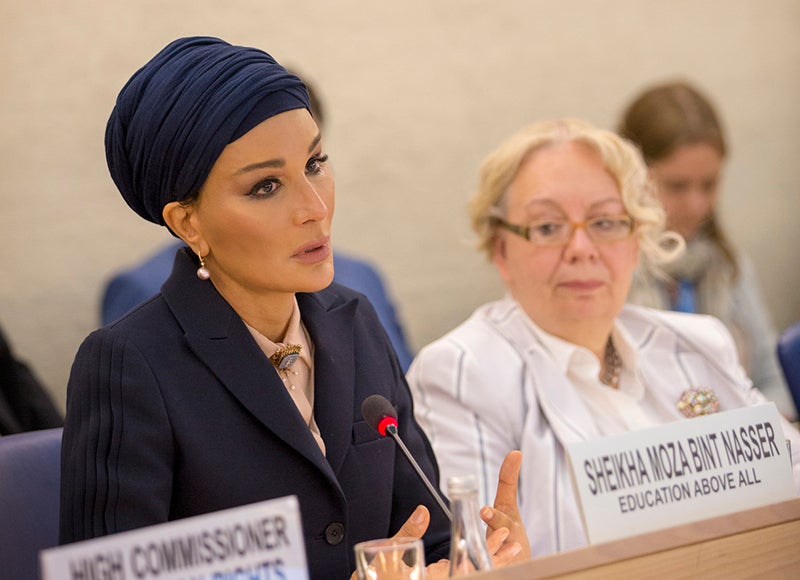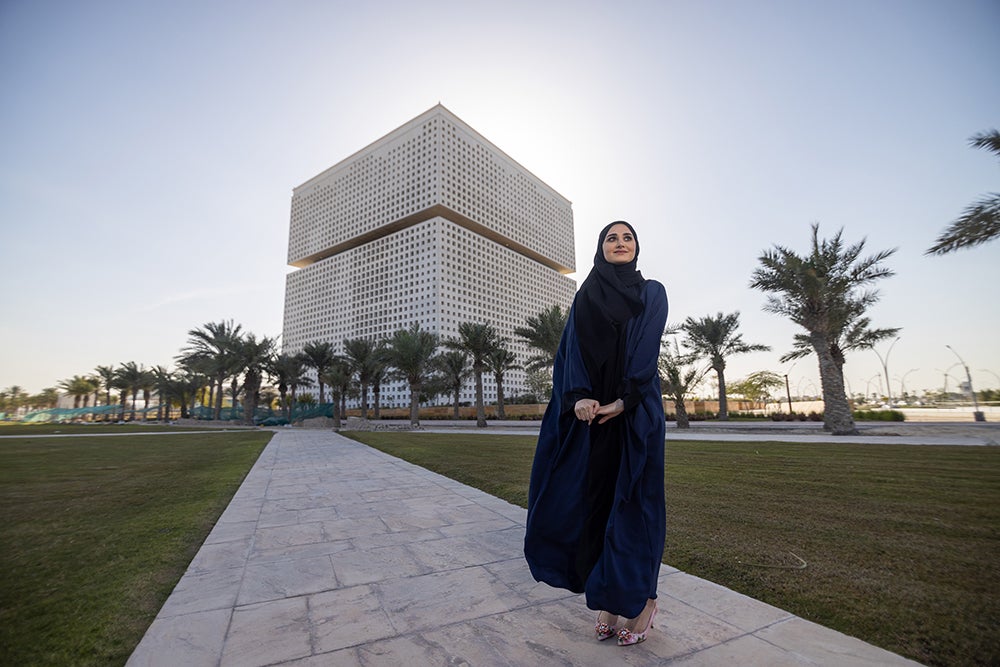Deena Sawali, a recent graduate of the College of Humanities and Social Sciences, conducts a 10-year analysis of Her Highness Sheikha Moza's education speeches.

“The right to quality education is, I believe, the perfect path to bridge the gap between different cultures and to reconcile various civilizations. Without this right, the values of liberty, justice, and equality will have no meaning. Ignorance is by far the biggest danger and threat to humankind.”
Her Highness Sheikha Moza bint Nasser
With this statement, Deena Sawali reflects on two years’ worth of academic work. Sawali, a graduate of the College of Humanities and Social Sciences’ Master of Arts in Digital Humanities program, has made an unwavering commitment to analyze the royal family member’s education-focused speeches over a 10-year period. Her motives, she says, do not fall short of recognizing the important role Her Highness has played in transforming the status of women.
“The focus on the public statements delivered by Her Highness Sheikha Moza stems from her remarkable contribution to women empowerment and equality both nationally and globally,” explains Sawali. “Over the past century, a lot of women have immersed themselves into the world of politics, scaling new heights, transforming the world and inspiring others in many ways. Yet, Her Highness Sheikha Moza has distinctively redefined the image of a contemporary female leader. I feel privileged to be witnessing this transformation every day.”
Sawali’s thesis focused on analyzing speeches throughout the period of 2009 to 2018. To do so, she employed two different text-processing tools -- DocuScope and AntConc -- to measure shifts in tone, context, and stance throughout this time period. The stances could further be classified as one of two opposing categories: telescopic vs. microscopic, clarity vs. passion, ceremonial vs. realism, or positive vs. negative.
“The employment of two different text-processing technologies takes my research beyond the traditional paradigm of speech analysis,” believes Sawali. “DocuScope reveals statistically significant changes and language patterns in text. Drawing on these results, I was able to identify liminal points, major trends and shifts in the rhetoric Her Highness Sheikha Moza employed to advance her educational projects. Along with the initial findings, I used AntConc which is an analysis tool that generates a list of all the words in the transcript, in order to analyze unique word choices and identify significant areas in Her Highness Sheikha Moza’s public statements.”
Sawali’s findings revealed analytical shifts that ran in parallel with changes in Her Highness’ narratives. For example, Sawali classified some of Her Highness’ earlier statements as ceremonial where Her Highness Sheikha Moza’s statements sounded more formal, assumed stance, and promoted human potential while focusing on Qatar’s development between 2009 and 2011. Between 2017 and 2018, the variables associated with her speeches were character, description, and narrative.

“I classified that period as “realism” because it indicates the rise of a realist position that education is not separate from society’s challenges.”
These periods also denoted a more somber approach to her speeches. “Her 2009-2011 speeches included terms such as “scientific”, “research” and “knowledge” as she describes Education City and reinforces national scientific research and development. The speeches are all about knowledge and scientific research being infused into the national strategy while promoting human rights. However, in Her Highness Sheikha Moza’s turn to realism, we can also see that terms such as “poverty”, “war” and “refugees” are vigorously introduced.”
Most importantly, explains Sawali, is her observation of the usage of the word “children” growing exponentially, as children remained one of Her Highness Sheikha Moza’s main focus areas in her realist speeches. Other terms that strongly emerged in the same period included “women” and “gender”.
“Towards 2018, Her Highness states that education can’t be treated as an isolated factor of society’s problems, and this is also where her public presentations became predominantly realistic. Education is no longer seen as a silver lining; its challenges reflect severe issues faced by the world. These challenges encompass a broad spectrum of global woes, such as poverty, unemployment, war, and terrorism -- all of which counter and undermine the positive effect of education.”
As a former student of the digital humanities program, Sawali says her studies offered her unprecedented learning opportunities. “Before starting my thesis, we worked on a project to analyze Hillary Clinton’s speeches using DocuScope. We considered the role of Hillary Clinton across three pivotal stages of her career as first lady, US state senator, and finally secretary of state. The results we obtained were astounding where we were able to see linguistically, discursively, and statistically the changes in Clinton's language,” said Sawali.
“It was a moment where I truly witnessed the power of discourse and the potential that advanced technologies and methodological approaches have in helping us understand the society around us through language.”
Click here to read more about CHSS students analyzing the poetry of Qatar’s founder, His Highness Sheikh Jassim bin Mohammed Al Thani.



